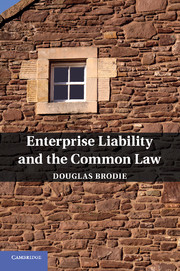Book contents
- Frontmatter
- Contents
- Preface
- Abbreviations
- 1 Introduction
- 2 The reception of Bazley v Curry
- 3 Enterprise risk
- 4 The risk and the individual
- 5 The enterprise
- 6 The borrowed employee
- 7 Independent contractors
- 8 Transferring the burden: the employer's right of indemnity
- 9 Risk and the employment relationship
- 10 Enforcement of the employment contract
- 11 Enterprise liability and non-delegable duties
- 12 Fundamental obligations
- 13 Concluding remarks
- Index
2 - The reception of Bazley v Curry
Published online by Cambridge University Press: 17 November 2010
- Frontmatter
- Contents
- Preface
- Abbreviations
- 1 Introduction
- 2 The reception of Bazley v Curry
- 3 Enterprise risk
- 4 The risk and the individual
- 5 The enterprise
- 6 The borrowed employee
- 7 Independent contractors
- 8 Transferring the burden: the employer's right of indemnity
- 9 Risk and the employment relationship
- 10 Enforcement of the employment contract
- 11 Enterprise liability and non-delegable duties
- 12 Fundamental obligations
- 13 Concluding remarks
- Index
Summary
Bazley v Curry has proved to be very influential but its reception has been far from uncritical in jurisdictions outside Canada. For example, it has provoked a very mixed response amongst the members of the High Court of Australia. Initially, in Hollis v Vabu, the High Court embraced the reasoning in Bazley. Contemporary Australian conditions dictated that ‘the conduct by the defendant of an enterprise in which persons are identified as representing that enterprise should carry an obligation to third persons to bear the cost of injury or damage to them which may fairly be said to be characteristic of the conduct of that enterprise’. The key issue in Vabu was whether the employer was responsible for the activities of a courier whose employment status was in issue. The case centred upon the composition of the employer's enterprise. The subsequent case of New South Wales v Lepore displayed great diversity of opinion and, more significantly, only minority endorsement of Bazley. The context was very different to Vabu; Lepore concerned the sexual assault of a pupil by a teacher. The facts, for a case of this type, were all too familiar. The claimant maintained that he was sexually assaulted on a number of occasions by his primary school teacher. The sexual assaults were said to have occurred after he was sent to a storeroom attached to the classroom on account of his misconduct in class.
- Type
- Chapter
- Information
- Enterprise Liability and the Common Law , pp. 16 - 26Publisher: Cambridge University PressPrint publication year: 2010



